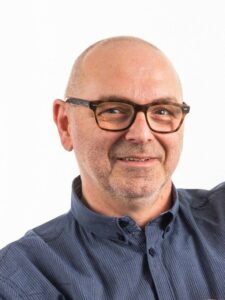
OT-hero Pierre: The man with a plan

Pierre Seeuws (62), proud father of 3 adult sons and stepdaddy of two lovely stepdaughters.
This busy bee is part of numerous associations and organizations. With his busy schedule, he puts occupational therapy on the map and opens doors. A man with a plan and passion for his profession. That is what we like to see at OT-Pro.
Who is Pierre Seeuws?
Occupational therapy is a common thread throughout my life. I have been a member of the board of the professional association Ergotherapie Vlaanderen or EV, in English: Occupational Therapy Flanders) since 1983. There I have had different functions; I have been out for a few years due to health reasons and due to my task as an informal carer. Since 2013 it is again “everything for Occupational Therapy”. As an occupational therapist, I have always worked with elderly people with dementia and also within palliative care.
What does ‘Ergotherapie Vlaanderen’ do?
‘ErgotherapieVlaanderen’ is the professional association for Flemish occupational therapists. The tasks of a professional association are very diverse. It goes from supporting the individual colleagues, promoting occupational therapy, guarding the quality of the implementation, and increasingly advocating and defending the interests of occupational therapy and its clients/patients with all organizations in our network and the authorities.
What do you do in particular as president?
My task is twofold:
– on the one hand, to monitor and follow up on the good functioning of EV as an organization/ non-profit organization
– on the other hand, I represent the profession in all possible forums, organizations, and authorities.
Especially the latter has experienced exponential growth in the last decade, which is good for our profession.
In which organizations are you still involved and what exactly is your task there?
Within the ergo-world, I am involved in working groups and consultation bodies at the Flemish level (e.g. VLOE,Vlaams OverlegErgotherapie or Flemish consultation on occupational therapy, the consultation with the colleges and universities). On the European level, within the General Assembly of COTEC, the European umbrella organization of occupational therapy associations, as well as within the world organization WFOT.
In addition, I have a seat on the councils of the NIHDI (RIZIV in Dutch), the FPS Public Health, the VAZG, the Care Consultation of the Federation of Free Professions (FVB/UNIZO), and others.
What is your biggest dream for all occupational therapists?
My big goal is the full recognition of occupational therapy both within services/institutions and in primary care. There is still a lot of work to be done there…
What is your biggest frustration?
The blockade that some organizations and/or professions place on our development and recognition. Corporatism is counterproductive, holding back the development of a high-performance health system based on quality, multidisciplinary and integrated care. The victims of this are all of us, because everyone is a “patient” at one point or another in their lives.
Are there big differences between occupational therapists in Flanders and Wallonia?
We are doing everything possible to keep occupational therapy at the same level in the entire Belgian context so that they can offer the same services. ‘ErgotherapieVlaanderen (EV) and the French-speaking Union Professionnelle des Ergothérapeutes (UPE), are loyal partners within the federal Ergotherapy Belgium (EB). The decisions that concern all Belgian occupational therapists are taken in mutual consultation. By the way, my colleague president of UPE and I are both equal co-chairmen of EB. Unfortunately, there is no French-language Master’s program yet.
Do you also have contacts abroad?
I represent the Belgian occupational therapists at the European and global levels. So international consultation and cooperation are fixed ingredients in my work schedule.
Which country is the best practice example for occupational therapy?
I had the privilege of being part of a Flemish working group invited by the Danish professional association for a full week. It is wonderful to see how in Denmark they manage to fully utilize the competences of the caregivers. Occupational therapy there has a central coordinating function within primary care.
What do you think about the valuation of the profession in residential care centers?
Do you have a few hours? I have worked in residential care centers for 25 years. And I have seen that occupational therapy thinking and doing can be a particularly valuable asset in the residential care. But one must then also allow it
Currently, occupational therapists in residential elderly care are being surveyed. Because we are getting more and more signals that occupational therapists are not used correctly. They are increasingly being used in care and maintenance tasks outside the COVID context. That is not ok!
I advise colleagues to pay close attention to the information in the EV Newsletters. More info to follow…
In the future, do you see occupational therapists and physiotherapists working better together?
Today’s occupational therapists and physical therapists need to work together, respecting mutual expertise and competencies. A physical therapist cannot do occupational therapy, and mutually. And there are also common competencies, and that is a wealth. In healthcare, a 1+1 good collaboration always equals 3! As I already wrote: I am a believer in interdisciplinary collaboration.
Should there be sensitization to the (general) practitioners? Ergo in the spotlight?
Yes, and also to all other professions. But we are on the right track. At the beginning of this century, occupational therapy was still a big unknown-unloved. But that is changing more and more. Step by step, Akela we are doing our best.
Why do the unions support OT-Pro?
Digitization is a necessity and a virtue. If we want to work together, we need to be able to share information efficiently. And our time should be spent on occupational therapy, not too much on administration and meetings.
OT-Pro’s content was developed by occupational therapists for occupational therapists. That is unique! We followed the growth process within PXL closely, and when the University decided to commercialize a professional version, we jumped on the boat immediately.
And then came Q-Top, and then OT-Pro. A collaboration between the world of education (PXL and later the VLOE), the field of work (EV) and the world of IT professionals. Top team!
Why is a tool for occupational therapists so important?
Efficient communication, correct profiling and a performing OT-Pro are an important path to a full-fledged implementation of occupational therapy in primary care
I would even dare to say: without the tool, without OT-Pro we will never get there.
Is there interest from other countries?
There is effective interest from the international ergo-world. Both the COTEC and WFOT organizations, as well as their member states, recognize the value of OT-Pro. We have already been able to briefly present the tool at meetings. Germany and Poland already showed interest in implementing it with them, and more will follow. The ICF is well known in the international ergo world. The fact that OT-Pro is based on it is an important asset.
What are you most proud of in all that you have already done?
Hard to say. If I look over the last few years: obtaining a seat within the Insurance Committee of the NIHDI. I’ve been working on that for more than 20 years. It’s a start, but it counts. It opens doors.
What is your biggest frustration?
That it’s sometimes so incredibly slow. Fighting against prejudice, ill will, rigidity and corporatism takes a lot of energy. And why …
